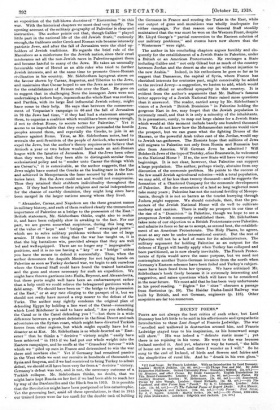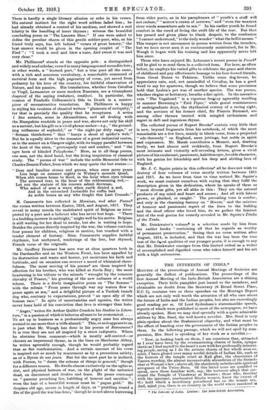RECENT POEMS.*
POETS are not always the best critics of each other, but Lord Dunsany has left little to be said in his affectionate and sympathetic Introduction to these Last Songst of Francis ji.edwidge. The war revelled and wallowed in destruction around him, and Francis Ledwidge stayed true to his inspiration, as his homeward songs will show.'; His was indeed a "delicate rustic muse " ; yet there is no repining in his verse. He went to the war because Ireland needed it. And yet, whatever way he turned, "the hills of home are in my mind, and there I wander as I will." So he sang to the end of Ireland, of birds and flowers and fairies and the simplicities of rural life. And he "drank in his own glass."
• (1) Last Songs. By Francis Ledwidge. With an Introduction by Lord Dunsany. London : Herbert Jenkins. [3s. 6d. net.)—(2) Things New and Old. By John Swinnerton Philihnore. Oxford University Press : Humphrey Milford. [68. net.)-- (3) Messlnes, and other Poems. By Emile Cammaerts. English Translations by Tits Brand-Cammaerts. London : John Lane. [3s. ed. net.]—(4) Poems. By Geoffrey Dearmer. London : W. Heinemann. 128. 64. net.1--(5) Resentment. Poems by Alec Waugh. London : Grant Richards. 13s. 6d. net.]—(6) The Vagabond, and other Poems from "Punch." By R. C. Lehmann. London John Lane. [3s. 6d, net.)—(1) The Colleded Poems of Rupert Braoke . wi1i a Memoir. London : Sidgiciek and Jackson. [10s. 6d. net3--(8) Poems : First Set ;es. By J. C. Squire. London : Martin Seeker. [6s. net.]---(9) Poems, 1908-1914, By John Drinkliater. London Sidgm ick and Jackson. [5s, net.]
There is hardly a single literary allusion or echo in his verses. His natural instinct for the right word seldom failed him ; he had already obtained a control of his medium, and showed a real felicity in the handling of inner rhymes ; witness the beautiful concluding poem on "The Lanawn Shea." If one were asked to define the peculiar charm of this gentle soldier-poet, who, as his friend truly says, has left behind "verses of great beauty," the befist answer would be given in the opening couplet of "The Find " : "I took a reed and blew a tune, And sweet it was and very clear."
Mr. Phillimorel stands at the opposite pole a distinguished and widely read scholar, versed in many languages and recondite lore; in other words, a "learned poet," but a true poet all the same, with a rich and sonorous vocabulary, a remarkable command of metrical form and the high pageantry of verse, yet saved from pedantry by his love of the country, his faithful observation of Nature, and his passion. His translations, whether from Catullus or Virgil, Lennontov or more modern Russians, are a triumphant disproof of the saying tradultori, traditori. In particular, the version of Pendell° Collenuecio's Ode to Death is a master- piece of reconstructive translation. Mr. Phillimore is happy in styling his versions of classical writers " glamours of antiquity," for that is precisely the quality that he recaptures. A series f fine sonnets, some in Alexandrines, and all dealing with the Hampshire roadside in peace and war, shows not only his skill as a metrist, but his gift as a vivid phrase-maker—e.g.," the ground. ling oriflamme of asphodel," or "the night-jar drily rasps," or "flotsam thistledown" that "buoys a shoal of spider's web." But he is equally alive to the romance of a great industrial centre, as in the sonnet on a Glasgow night, with its happy parallel between the hoot of the siren, "grotesquely vast and sombre," and "the ogre horn of blinded Polypheme." Here, as in all thee° poems, one sees, not the dead hand, but the living inspiration of classical study. The "poems of war" include the noble Memorial Ode to Charles Dennis Fisher, from which we may quote the last stanza :- "Dear and familiar stones and greens when once more peace Lies large on summer nights in greens, moonlit Quad,
When ebb comes home to flood, in the hour when eyes release The arrested tear, in the hour of the reblossoming rod,— Let not the stature of his renown admit decrease, Who asked of seas a wave when earth denied a sod, And in the entombed Invincible for coffin laid As noble bones as any who fought this Last Crusade."
M. Cammaerts has collected in Messines, and other Poems' the verses written between Easter, 1916, and August, 1917. They reveal in many moods the undefeated spirit of Belgium as inter- preted by a poet and a believer who has never lost hope. "There is a budding morrow in midnight," might well be his motto. Belgium is still waiting for her dead to awake, but she is waiting in hope. Besides the poems directly inspired by the war, the volume contains four poems for children, religious in motive, but touched with a tender element of fantasy. Mme. Cammaerts supplies faithful rhythmic, but unrhymed, renderings of the free, but rhymed, French verse of the originals.
Mr. Geoffrey Dearmer has seen war at close quarters both in the Dardanelles and on the Western Front, has been appalled by its destruction and waste and horror, yet maintains his faith and fortitude, and on occasion can recover a mood of whimsical cheer- fulness. The most moving of his poems* are those inspired by affection for his brother, who was killed at Suvla Bay ; the most heartening is his tribute to the miracle "wrought by the common chivalry of France," his greeting of the new radiance of a world reborn. There is a finely imaginative poem on "The Somme" with the refrain "From peace through war my waters flow to peace again at sea," and a delightful picture of a Turkish trench dog who, contrary to expectations, proved "an open ally of the human race." In spite of uncertainties and agonies, the writer never loses hold of his conviction that love is stronger than hate.
"Anger," writes Sir Arthur Quiller-Couchin his Studies in Litera- ture," is a passion of which it behoves all men to be economical. . . • To set up in business as a professionally angry man has always seemed to me more than a trifle absurd." This, or so it appears to us, is just what Mr. Waugh has done in his poems of Resentment& It is true they are not all inspired by a /mesa indignatio. Where he abstains from comment—which is mostly self-centred—or chooses an impersonal theme, as in the lines on Sherbome Abbey, he writes agreeably enough, though he would probably regard that as flat condemnation. And a certain amount of his verse is inspired not so much by resentment as by a precocious satiety, as of a Byron de nos jours. But for the most part he is inclined, with Person, to "damn the scheme of things in general," though for a different reason. He dwells almost exclusively on the ugliness, dirt, and physical horrors of war, on the plight of the unburied dead, on discontent and doubts and fears. He pours contempt on "parsons preaching lies, babbling of honour and sacrifice " ; even the hair of a beautiful woman must be "pagan gold." He despises old age, secure in length of days, or "prattling round a fire of the good the war has done," though he is noV above borrowing
from elder poets, as in his paraphrases of "youth's a stuff will not endure," "sorrow's crown of sorrows," and "even the weariest river winds somewhere safe to sea." In his earlier youth he found comfort in the creed of living _the swift life of the rose. But that has passed and given place to blank despair, to the confession "I cannot understand," to the daily wonder" what the hell it means." This temper is not uncommon in poems written from the trenches, but we have never seen it so continuously maintained, for in Mr. Waugh it began with his training and has apparently never left him since.
Those who have enjoyed Mr. Lchmann's recent poems in Punch& will be glad to re-read them in a collected form. For here; as often before, he employs his varied gifts to celebrate the grace and charm of childhood and pay affectionate homage to his four-footed friends, from Great Danes to Pekinese. Unlike some dog-lovers, he appreciates cats, and, not unmindful of Catullus, he has a good word to say for sparrows, though we believe that some precisions hold that Lesbia's pet was of another species. The war poems, whether elegiac or hortatory, breathe a fine spirit. In the narrative vein "The Vagabond" is a vigorous fanjasy agreeably recalling in manner Browning's "Pied Piper," while genial reminiscences of undergraduate days, the rhythmical ecstasy of a racing eight, and the services of his former chief, Sir Francis Burnand, are among other themes treated with mingled enthusiasm and regret in deft and ingenious rhyme.
The collected poems of Rupert Brooke7 contain very little that is new, beyond fragments from his notebook, of which the most
remarkable are a few lines, mainly in blank verse, from a projected " ode-threnody " on England, mere jottings, but noble in spirit and expression. Mr. Marsh contributes a Memoir, and, drawing freely, we had almost said recklessly, from Rupert Brooke's most intimate and violently self-revealing letters, gives a vivid picture of his exuberant, passionate, kaleidoscopic, lovable character, with his genius for friendship and his deep and abiding love of England.
Mr. J. C. Squire prints in this collection* all he does not wish to destroy of four volumes of verse mostly written between 1911 and 1917. As we have from time to time noticed Mr. Squire's work, we must content ourselves with saying that they fulfil tho description given in the dedication, where he speaks of them as "most diverse gifts, yet all alike in this : They are the natural products of my mind and heart and senses ; And all with labour grown, or plucked, or caught." The prevailing tone is sombre, and only in the charming fantasy on "Rivers," and the mixture of humour and passionate regret of the lines to the bulldog and the dead officer who loved him, do we gather the faintest hint of the real genius for comedy revealed in Mr. Squire's Tricks of the Trade.
Mr. Drinkwater's volumes is a selection made by him from his earlier books "containing all that he regards as worthy of permanent preservation." Seeing that no verse written after August, 1914, is included, and that the war has been the true test of the fvaest qualities of our younger poets, it is enough to say that Mr. Drinkwater emerges from this limited ordeal as a writer of accomplished and dignified verse who takes himself and his art with a high seriousness.



































 Previous page
Previous page